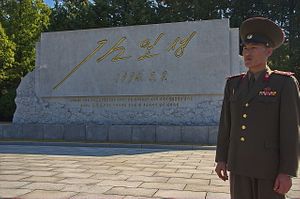The North Korea situation shook Japan in April. As relations between Pyongyang and Washington deteriorated further, Japanese media talked incessantly of war and the possibility of North Korean missiles hitting Japan. Then, in mid April, the Trump administration began declaring that the United States would not ask North Korea to change its regime. North Korea also made moves of its own, for instance reestablishing the Diplomatic Commission at the Supreme People’s Assembly for the first time in 19 years on April 11. Both sides appear to have changed course in favor of diplomacy.
Looking back on the crisis in April, much of the Japanese unease can be attributed to the unpredictability of the Trump administration, rather than from any sudden change in speech and behavior on the North Korean side. Articles appearing in the Rodong Sinmun, including statements made by the press secretaries of the North Korean Ministry of Foreign Affairs, have certainly not relaxed the ultra-hard line that North Korea is prepared to launch preemptive strikes on the United States. Yet Kim Jong-un himself has avoided making such remarks. In fact, the North Korean leader refrained from making any statement at all at the review of troops commemorating the 105th anniversary of the birth of Kim Il-sung on April 15. In his place, Vice Chairman Choe Ryong-hae of the Central Military Commission of the Workers’ Party of Korea delivered a speech, during which he emphasized the fact that North Korea would strike back if the United States attacked his country. Checking on the people making statements, rather than simply accepting the substance of reports in the Rodong Sinmun and on the Radio and Television Broadcasting Committee of the Democratic Peoples’ Republic of Korea, is essential for understanding North Korea’s logic. During this time, Kim Jong-un engaged in activities including inspection tours of a pig farm and a plant for manufacturing daily necessities. He did not go into hiding. All of which suggests that North Korea was keen to avoid a war.
In South Korea, Moon Jae-in assumed the presidency on May 10, inaugurating the first reformist administration in nearly a decade. A central figure in the Roh Moo-hyun administration, Moon Jae-in followed a policy of appeasement towards North Korea. Now president, Moon has announced the reopening of Kaesong Industrial Park, where operations had been suspended by Park Geun-hye. It appears to be only a matter of time before North-South dialogues are resumed and a North-South summit meeting is held for the first time in 10 years, notwithstanding the test missile launches by North Korea.
South Korea is scheduled to host the Winter Olympics in PyeonChang in February 2018 and the time is ripe for non-governmental North-South exchanges. The real intention of the Kim Jong-un administration is assumed to be commencing direct negotiations with the Trump administration. Any immediate renunciation of nuclear and missile development is unlikely, however. So North Korea is likely to first call out to South Korea for dialogue and to seek to rapidly restore North-South relations. Pyongyang can also expect Seoul to act as a mediator between itself and the United States.
The avoidance of a war should be welcomed, but a North-South dialogue without the involvement of Japan, which has yet to resolve the abduction issue with North Korea, will be another cause for concern in Tokyo if it occurs. That’s because it will make it more difficult than ever before for Japan, the United States and South Korea to coordinate on North Korea and involve China. Trump says that he is keeping all options on his table. A major compromise is also possible, depending on how North Korea responds. Despite his initial rhetoric, Trump seems to have concluded that bombing North Korea, with all that would entail for South Korea and Japan, where U.S. armed forces are stationed, would be problematic to say the last. Nevertheless, it is hard to believe that the Trump administration will take the hands-off policy – known as strategic patience – of the Obama administration, given Trump’s strongly worded criticism of that policy, which he said allowed North Korea time to develop nuclear missiles.
Trump cannot ignore North Korea, but nor is military action feasible. As such, bold diplomacy would appear the only reasonable option. In that context, it is worth noting that Trump has appointed former U.S. Secretary of State Henry Kissinger, who led the United States to the normalization of diplomatic ties with China, as his diplomatic coach.
If and when the United States does begin to join South Korea in holding a dialogue with North Korea, Japan will have to quickly ask itself whether limiting its approach to pressure is a good idea. Washington began to grow impatient when faced with the reality that North Korea’s missile range had begun to reach the continental United States. That was the original cause of the latest crisis. Japan and South Korea fell within that range a long time ago. Japan should have worked with South Korea then to have the United States understand the serious nature of North Korean issues. Worsening relations with South Korea ensured that couldn’t happen. And that is another fact for Tokyo to ponder.
Atsuhito Isozaki is an associate professor at Keio University.

































